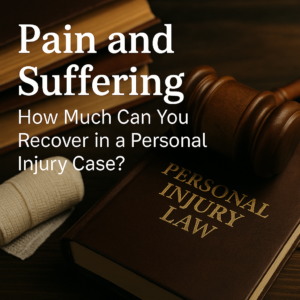
Understanding Pain and Suffering in a Personal Injury Case
When someone is injured in an accident, some financial losses are straightforward. For example, medical bills and lost wages are usually easy to calculate.But what about the physical pain, emotional trauma, and life disruptions caused by the injury? These are considered pain and suffering damages, which can add significant value to a personal injury claim.
So, how much can you recover for pain and suffering? The answer depends on several key factors. These include the severity of the injury, how it impacts your daily routine, and the way courts or insurance companies calculate non-economic damages.
Personal Injury Matters – Legal Glossary
What Do Pain and Suffering Damages Include?
Pain and suffering refers to the physical and emotional distress caused by an injury. These damages cover more than just financial losses. They also compensate for long-term effects the injury has on a person’s physical and emotional well-being.
Common components of pain and suffering damages include:
-
Physical pain and discomfort
This includes ongoing pain, nerve damage, limited mobility, and other physical impairments. -
Emotional distress
Victims may experience anxiety, PTSD, depression, or lingering trauma from the accident. -
Loss of enjoyment of life
The inability to participate in hobbies, family time, or other day-to-day activities. -
Disfigurement or permanent scarring
Visible injuries can lead to embarrassment, lowered confidence, and psychological harm. -
Loss of consortium
If the injury affects a relationship with a spouse or partner, this may also be compensable.
💡 Pro Tip:
Insurance companies often try to reduce pain and suffering payouts. To fight back, you need strong documentation—medical records, mental health evaluations, and expert testimony all strengthen your claim.
Learn more about how courts define pain and suffering damages in personal injury claims.
How Is Pain and Suffering Compensation Calculated?
The Hidden Costs of a Personal Injury: What Victims in Philadelphia Need to Know
Unlike medical bills, there’s no fixed formula for calculating pain and suffering damages. However, courts and insurance companies commonly use two main methods:
1. The Multiplier Method
This method multiplies the total economic damages (medical bills, lost wages) by a number between 1.5 and 5, depending on the severity of the injury.
2. The Per Diem Method
This approach assigns a daily value to the pain and suffering and multiplies it by the number of days the victim is affected.
⏩ Pro Tip: The more severe and long-lasting the injury, the higher the potential payout.
Factors That Affect Your Pain and Suffering Settlement
Not all pain and suffering claims are valued the same. The amount you can recover depends on several key factors:
Factors That Increase Compensation
✅ Serious, Permanent Injuries – Cases involving disfigurement, paralysis, or chronic pain often result in higher settlements.
✅ Long-Term Impact on Life – If the injury prevents you from working or enjoying life, compensation increases.
✅ Strong Medical Evidence – Doctor’s reports, therapy records, and expert testimony strengthen your claim.
✅ Emotional and Psychological Trauma – Cases with documented PTSD, depression, or anxiety can lead to higher payouts.
✅ Clear Fault of the Other Party – If liability is obvious, settlements are typically higher.
Factors That Decrease Compensation
❌ Pre-Existing Conditions – Insurance may argue that your injuries were not caused by the accident.
❌ Gaps in Medical Treatment – If you delay treatment, the insurance company may claim your injuries aren’t serious.
❌ Comparative Negligence – If you were partially responsible for the accident, your payout may be reduced.
❌ Low Insurance Policy Limits – If the at-fault party has low coverage, your compensation may be limited.
⏩ Pro Tip: A personal injury lawyer can fight for higher compensation and challenge insurance tactics that try to reduce your settlement.
How to Maximize Your Pain and Suffering Compensation
If you’re filing a personal injury claim, here are some steps to strengthen your case:
✔ Seek Immediate Medical Attention – Prompt treatment proves the severity of your injuries.
✔ Keep a Pain Journal – Document daily pain levels, emotional distress, and activity limitations.
✔ Follow Doctor’s Orders – Any gaps in treatment can hurt your claim.
✔ Hire a Personal Injury Lawyer – An attorney can negotiate a higher settlement and handle insurance disputes.
⏩ Pro Tip: Never accept the first settlement offer—insurance companies lowball victims hoping they’ll settle quickly.
Why Legal Representation Matters in Pain and Suffering Claims
Pain and suffering compensation often represents the largest portion of a personal injury settlement, especially in cases involving long-term or permanent injury. While financial losses like hospital bills and lost wages are straightforward, non-economic damages require persuasive legal arguments and compelling documentation. That’s why it’s essential to work with an experienced personal injury attorney who understands how to present your story to insurers, judges, or juries. Your lawyer can demonstrate how the injury affected your relationships, daily routines, and emotional well-being—turning an abstract concept into a measurable claim for justice.
It’s important to remember that every personal injury case is different. While two people may suffer similar physical injuries, the emotional and psychological toll can vary greatly. Therefore, tailoring your claim to reflect your unique experience strengthens your case and increases your chances of fair compensation.
The legal term “pain and suffering” refers to the physical and emotional stress resulting from an injury.
Final Thoughts: Get the Compensation You Deserve
Pain and suffering damages can significantly increase the value of a personal injury settlement. However, proving non-economic damages requires strong evidence and legal expertise. If you’ve been injured due to someone else’s negligence, you may be entitled to substantial compensation.
Philly Legal Connect is an independent legal news and information platform. We are not a law firm, and we do not provide legal representation, legal advice, or attorney-client services. The content on this website is for informational purposes only and should not be considered legal advice. If you require legal assistance, we strongly recommend consulting a licensed attorney in your jurisdiction. Use of this website does not create an attorney-client relationship.


